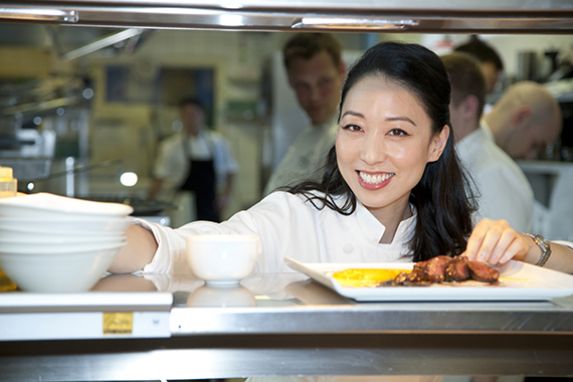Making Korean Food Simple
As the only participant to serve as chef, judge and challenger throughout the Iron Chef series, Judy Joo has made a name for herself in the culinary world. Having worked as Executive Chef at the Playboy Club, and host of the Cooking Channel’s new series, Korean Food Made Simple, Joo’s success has ranged from being the first woman to win Iron Chef UK, a judge on the Next Iron Chef, Iron Chef America, and a competitor in the Battle Iron Chef UK vs. Iron Chef America. She also regularly appears on Food Network’s The Best Thing I Ever Ate, The Best Thing I Ever Made, and Guy’s Grocery Games. In her interview with Seoul Journal, Joo discusses how she got her start as a chef, her favorite cuisines, and her upcoming projects.
SJ: Can we start by learning a little bit about how you got started in this career?
JOO : It was really driven by not being entirely happy where I was in finance and what I was doing, and wanting to do something more creative. It was kind of driven by love and hate I would have to say. How much you hate your current position kind of serves as the catalyst to make decisions. And the love towards something else pulls you towards it. Then I enrolled in cooking school in New York City. I started working for a magazine based in New York City called Saveur magazine, working in kitchens and also on the editorial side – researching, cooking, recipes, writing editorials and checking kitchen articles. Everything I could find.
SJ: What was the big break in your career?
JOO: I would say the big break was probably when I got cast on Iron Chef in the U.K. That would probably be one of the bigger things that I did that kind of put me on the map.
 SJ: Did you ever imagine being an Iron Chef?
SJ: Did you ever imagine being an Iron Chef?
JOO: No, never in a million years. When I went to cooking school I kind of thought I would just have cool birthday parties for my kids. I didn’t really think it would ever lead to any of this and meeting the right people.
SJ: For example, what people? I understand that you have worked with Gordon Ramsay?
JOO: He wasn’t really in the kitchens when I was working there. So, it wasn’t really that. But in terms of meeting people, there’s a producer that I met kind of coincidentally when I was working in the Gordon Ramsay group and she wanted to put me on TV right away. So, that was where I got my first television gig – being the regular guest chef on the show in the UK called Market Kitchen and that led to Iron Chef and whatnot. Iron Chef led to other TV opportunities and it kind of snowballed from there.
SJ: Okay, let’s talk food. What kind of food has inspired your creativity the most?
JOO: I would definitely say I’m most inspired by the food from northeast Asia – so Japanese food, Korean food and Chinese food.
SJ: What kind of background do you have with Japanese and Chinese food?
JOO: Well, Korea, Japan and China have a closely intertwined history. You know, Japan occupied Korea for close to 35 years. The three countries are right next to each other and Korea was always a stepping stone to get to Japan and a stepping stone to get to China. So we actually share a lot of ingredients. We have generally the same type of topography; we can grow the same types of things. As you know, the execution is extremely different and the cultures are extremely different. You know, they all kind of hate each other. [laughs] But I would have to say, I’m extremely inspired by all of those cuisines.
SJ: What’s your favorite type of Japanese food?
JOO: Oh, sushi and sashimi by far.
SJ: What about Chinese food?
JOO: Oh, I love Chinese food. I would have to say my favorite would probably be dumplings. All kinds. Maybe xiao long bao, which is a steamed dumpling.
SJ: Doesn’t Korea have dumplings as well?
JOO: Yes. And you call them mandu.
SJ: What’s your favorite thing to cook?
JOO: Seafood.
SJ: What about eating?
JOO: I’d have to say Korean and Japanese food are my two favorite cuisines.
SJ: Where do you spend most of your time?
JOO: It depends on what I’m working on. Last year I spent most of my time, or a lot of my time, in the States. The past six months I’ve been stuck in London because I’ve been opening up my first restaurant. But now I’m actually off to Korea today. I’ll be in Korea for close to four weeks. We’re filming season two of Korean Food Made Simple. Also I’m working on a shoot to complete my book of the same name. So it depends on what I’m working on, where to find me in the world. Two weeks ago, I was in Hong Kong because we were opening up a second location of my restaurant in Hong Kong, so I’m going to be in Hong Kong a lot at the end of this year.
SJ: How are the openings going?
JOO: Really good. Very exciting. It’s a lot of work, but it’s fun.
SJ: What’s the most challenging part of your business?
JOO: I would say being a good manager and managing people. I think that is the most challenging– being a good leader and being a fair manager, inspiring people, being a mentor, being a role model, being a psychologist, being a friend. It’s physical. I think that’s probably the hardest part about the job. I have 40 employees, and just trying to manage everybody in all the different departments and all my senior managers need management also. They need help managing their junior staff and it’s difficult. It’s not something that you learn out of a textbook that you can really practice. It comes from experience, and everybody has their own different style of management. I find that you have to change your management style with different people. Certain people respond differently, you can bring out the best in people when you are flexible, some people need more coddling than others and some people work well with a stern word. It’s difficult. I guess you have to have a high level of EQ [emotional intelligence].
SJ: Let me ask you about your future plans.
JOO: I’m just trying to survive. [laughs] I’m just trying to get through tomorrow, honestly. I mean, everybody asks me this question. But, in terms of what I have coming up, there’s my book Korean Food Made Simple, which is being published by Houghton Mifflin Harcourt. It’s based also in the U.K.; it’s coming out May 2016. I’m about to embark on filming Korean Food Made Simple season two. That’s going to be on Food Network and Cooking Channel Worldwide, so all the way from Asia to the States, to all over Europe and Africa and the Middle East, so that’s exciting. That’s probably going to come out next year also. Then I’m opening up the second location of my restaurant in the fall this year in Hong Kong. So yeah, that’s what’s in store.
SJ: Did you ever think being Korean American was going to play to your advantage?
JOO: No, I didn’t. And I didn’t really think that I would ever become a chef or live abroad or any of that stuff. I kind of went to school thinking I would go into academia, becoming a chemist or something like that. I remember watching TV and my only role model was Connie Chung back then. And I remember looking at her thinking, “She’s on TV,” and thinking she was so amazing. It’s definitely changed and gotten better over the years. I’m definitely one of the few Asian faces on Food Network. We have representation in the news casting field, but when it comes to some of these other disciplines that are “non-traditional,” I definitely wanted to pioneer, and I hope that I make it easier for the younger lot to come through.
SJ: Do you wish that when you were younger, you embraced the Korean culture even more than you did?
JOO: Definitely. My parents didn’t speak Korean to us growing up, and so my Korean language skills are absolutely atrocious. I really wish I was fluent. But, I guess they kind of felt that when they left Korea, Korea was still poor and that they wanted their kids to grow up speaking perfect American English and it wasn’t so much of a priority to them. I had to start taking language courses to polish up my Korean.
SJ: What advice would you give to someone who’s just launching a restaurant?
JOO: Just to keep at it and don’t be afraid to do everything and anything. I’m literally picking stuff off the floor, busing tables, cleaning tables, jumping in the kitchen making things, looking at accounts, looking at the financial figures, dealing with buyers. So, you really have to have many different types of hats and be comfortable wearing all of them. You have to be able to talk to customers, you have to be able to manage your cleaning crew. So, it’s really all hands on deck in every way.
SJ: What’s your favorite aspect of your work?
JOO: I would say creating new dishes, I think that’s the most fun –the creative part, and coming up with different types of things. It’s just me and my guys… my two or three senior head chefs in the kitchen… and we’re just kind of experimenting. That’s so much fun. I would have to say it’s a very democratic process. We just start cooking. Everybody tries it. Everybody gets feedback. If we say it’s crap, we say why. [laughs] We come up with our most popular dishes just through this trial and error and a group effort. The way I see it, my job as a chef is not to make food that I necessarily love to eat. It’s to make food that everybody loves to eat and make dishes that are ubiquitously delicious. I love spicy food, and my Scoville scale is exceedingly high. I’m always asking my other chefs, “Is it too hot? Do you think it’s too spicy?” because I need to be grounded in the same way. When you serve a dish, you want 90% of the people to love it, if not more than that. That is your goal. Food is always subjective, but you’re trying to make something that is, as much as you can to your ability, universally inviting and tasty.
SJ: Do you prefer that to being on TV in general?
JOO: Yeah, definitely. Being on TV isn’t that glamorous. I mean it looks glamorous, but it’s a lot of work. I was out on a sort of four-week shoot and I packed like a thousand vitamins because I knew I was going to be tired and I can’t get sick. There are 5:00 am wake-up calls and nobody can do it quickly anymore, so you really have to think about what you’re going to say. You really have to concentrate and focus. You want to make sure you sound witty, peppy, funny, informative, engaging and welcoming. It’s hard. But I have to say I owe a lot to my education for my relatively rapid rise in the food industry. I think that being a good chef isn’t just about cooking anymore. Particularly with the rise of the celebrity chef and the whole media aspect. You have to be able to speak articulately. You have to be able to have strong communication skills, both written and oral.











